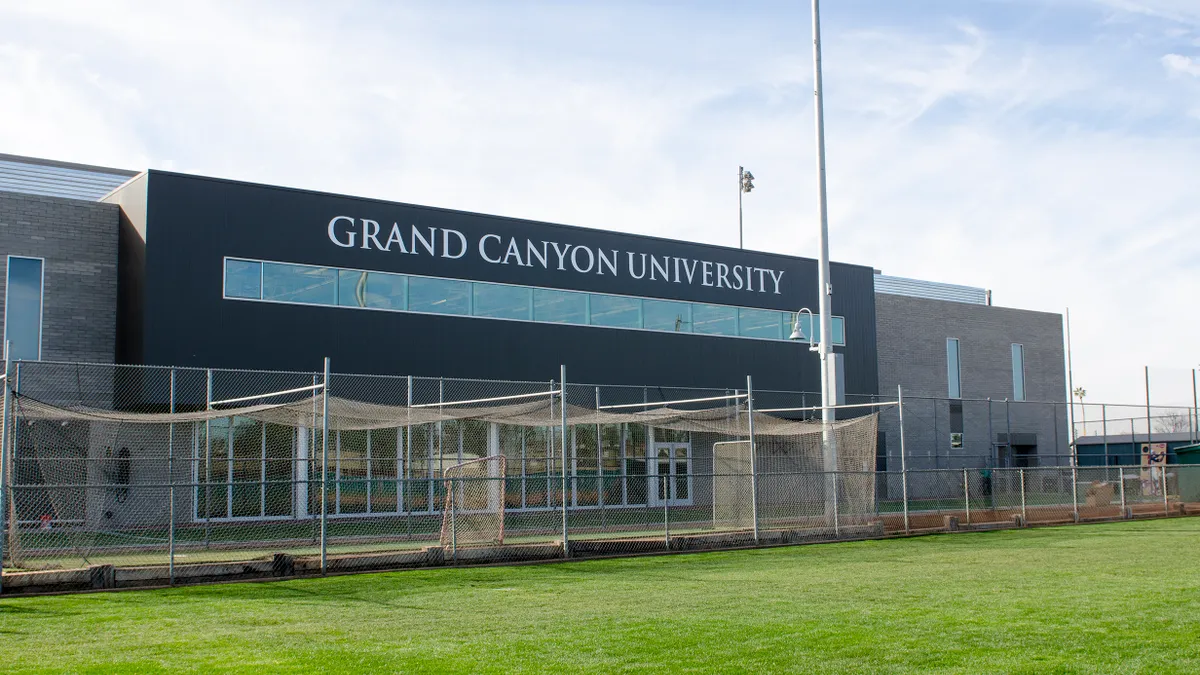Dive Brief:
- The U.S. Department of Education applied the wrong legal standard when denying Grand Canyon University’s request to be considered a nonprofit, a federal appeals court ruled last week, scoring a major win for the 123,000-student Christian institution.
- In 2019, the Education Department said it would continue treating Grand Canyon University as a for-profit for Title IV federal financial aid purposes. The decision kicked off a protracted legal battle over the university’s status, with a federal judge siding with the department in 2022.
- But a three-judge panel of the 9th U.S. Circuit Court of Appeals unanimously overturned that decision Friday, ruling that the Education Department held the university to a stricter standard than required under the Higher Education Act.
Dive Insight:
The ruling marks another dramatic turn in the fight over Grand Canyon University’s nonprofit status. The university hailed the decision in a statement Friday, with officials saying they are “hopeful that the Department will act in good faith and render a quick decision recognizing the university’s nonprofit status.”
With Friday’s decision, the panel overturned the Education Department’s denial and asked the agency to review the university’s request again using the correct legal standard.
The Education Department did not respond to a request for comment Monday afternoon about when it would issue a new decision and whether it would require Grand Canyon University to follow regulations governing for-profit institutions in the meantime.
Grand Canyon University operated as a nonprofit from its founding in 1949 until 2004, when officials sold the institution to private investors to avoid bankruptcy amid financial troubles. As part of the sale, the university transitioned to a for-profit model.
Over a decade later, officials sought to return to nonprofit status. To do so, the university in 2018 split off from its former parent company — Grand Canyon Education, or GCE.
However, the two didn’t part ways completely. Grand Canyon University struck a deal with GCE in which it agreed to pay the company 60% of its adjusted gross revenue in return for a wide array of services, including marketing and student support.
At the time, both the IRS and the state of Arizona had granted the university nonprofit status, designations that Grand Canyon University continues to hold today.
This split between the IRS and Arizona on the one hand, and the Education Department on the other, has meant Grand Canyon University has had to comply with certain regulations governing for-profit colleges. One of those is the 90/10 rule, which mandates that no more than 90% of a for-profit's revenue can come from federal financial aid sources.
In 2019, the Education Department acknowledged that Grand Canyon University had met the regulatory requirements to be considered a nonprofit by Arizona and had been granted tax-exempt status by the IRS. But it denied the institution’s request to be treated as a nonprofit for Title IV purposes.
In a lengthy explanation of its decision, the Education Department argued that the primary goal of the 2018 transaction was to “drive shareholder value” for GCE. The department also said the university was GCE’s “captive client — potentially in perpetuity.”
Grand Canyon University asked the Education Department to reconsider its decision, but the agency reaffirmed the denial in 2021. Grand Canyon University launched its lawsuit against the Education Department the same year.
“We hope the decision by the Ninth Circuit puts all of this federal government overreach behind us and we can get back to running a university,” Brian Mueller — who serves as both the university’s leader and the president and CEO of GCE — said in an emailed statement Monday.
In a recent earnings call, Mueller said he expected friendlier treatment from the federal government with former President Donald Trump having just been elected to a second term.
“I believe that we’re going to have a voice in what’s going to happen in this next administration in terms of what the future of higher education should be,” Mueller said on a Nov. 6 call with analysts.
The battle over the institution’s nonprofit status hasn’t been the only legal dispute between Grand Canyon University and the Education Department. The agency fined the university $37.7 million last year, accusing the institution of misleading students about doctoral program costs. Grand Canyon University has appealed the fine.
A hearing over the matter is scheduled for early 2025, Mueller said in an emailed statement.
Both GCE and Grand Canyon University also faced similar allegations from the Federal Trade Commission through a lawsuit filed last year. Although a federal judge recently dismissed some of the lawsuit’s claims, his ruling allowed the FTC to file an amended complaint.
“GCU is hopeful the court will again dismiss the FTC’s claims,” the university said in a statement Friday.















